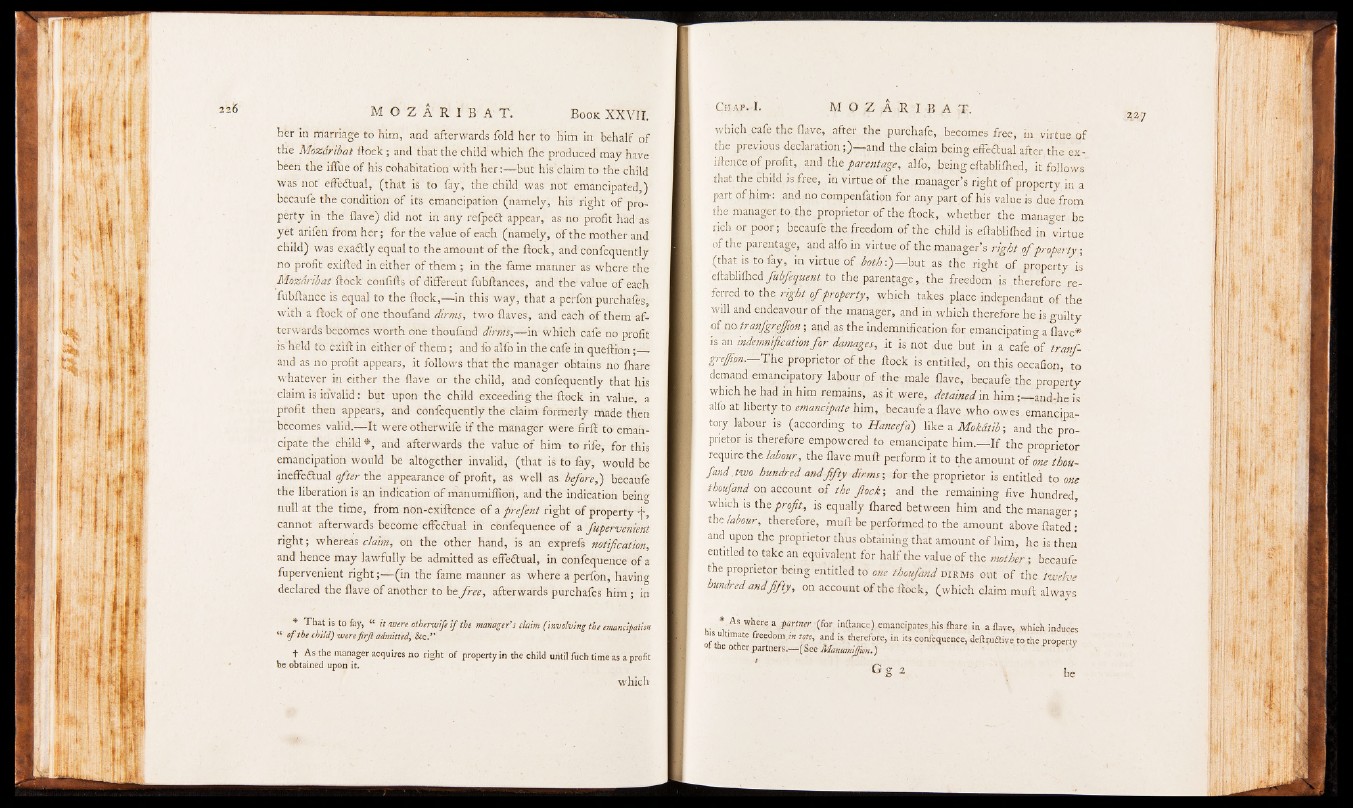
M O Z A R I B A T . B o o k XXVII.
hér in marriage to him, and afterwards fold her to him in behalf of
the Mözdribat Hock; and that the child' which fhe produced may have
been the iffue of his cohabitation with her:—but hisclaim to the child
was not effectual, (that is to fay, the child was not emancipated,)
becaufe the condition' of its emancipation (namely, his right of property
in the Have) did not in any refpeft appear, as no profit had as
yèt arifen from her; for the value of each (namely, of the mother and
child) was exa&ly equal to the amount of the flock, and confequently
no profit exifted in either of them ; in the fame manner as where the
Mozaribat flock coni ills of different fubftances, and the'value of each
fübftance is equal to the flock,—in this way, that a perfon purchafes,
with a flock of one thoufand dirms, two Haves, and each of them afterwards
becomes worth one thoufand dirms,—in which cafe no profit
is held to. exifl in either of them; and fo alfo in the cafe in queftion;__
and as. no profit appears, it follows that the manager obtains no fhare
whatever in either the Have or the child, and confequently that his
claim is invalid: but upon the child exceeding the flock in value, a
profit then appears, and confequently the claim formerly made then
becomes valid.—It were otherwife if the manager Were firft to emancipate
the child *, and afterwards the value of him to rife, for this
emancipation would be altogether invalid, (that is to fay, would be
ineffectual after the appearance of profit, as well as before,) becaufe
the liberation is an indication of manumiffiort, and the indication beino-
null at the time, from non-exiflence of a prefent right of property +,
cannot afterwards become effectual in cbnfequence of a fupervenient
right; whereas claim, on the other hand, is an exprefs notification,
and hence may lawfully be admitted as effectual, in confequence of a
fupervenient right;—(in the fame manner as where a perfon, having
declared the Have of another to be free, afterwards purchafes him; in
* T h a t is to fay, « it mere otherwife i f the manager's claim (involving the emancipation
“ o f the child) werefirjl admitted, See.”
t A s the manager acquires no right o f property in the child until fuch time as a profit
be obtained upon it.
which
Chap. I. M O Z A R I B A T. 227
whiçh cafe the Have, after the purchafe, becomes free, in virtue of
the previous declaration ;)—and the claim being effectual after the ex-
iftence of profit, and thz parentage, alfo,, being eflablifhed, it follow/
that the child is.free, m virtue of the manager’s right of property in a
part of him-: and no compenfation for any part.of his value is due from
the manager to. the proprietor of the flock, whether the manager be
rich or poor; becaufe :the freedom of the child is ellablilhed in°virtue
of the parentage, and alfo in virtue of the manager’s right of property ;
(that is to fay, in virtue of both:)— but as the right of property is
eflablifhed fubfequent to the parentage,. the freedom\is .therefore referred
to the right of property, which ta.k:es place independant of the
will and endeavour of the manager, and in which therefore he is guilty
of no tranfgrejion ; and^s the indemnification for emancipating a Have*
is an indemnification for damages, it .is not due but in a cafe of tranf-
grejfton. The proprietor of the flock is entitled, on this occafion, to
demand emancipatory labour of .the- male Have, becaufe the property
which he had in him remains, as it were, detained in him ;__and-heis
alfo at liberty to emancipate him, becaufe a Have .who owes ..emancipatory
labour is (according to Haneefa) like a Mokâtib-, and the proprietor
is therefore empowered to emancipate him.—If the proprietor
require the labour, the Have muff perform it to the amount of one thoufand
.two hundred andfifty dirms-, for the proprietor is entitled to one
thoufand on account of the flock-, and the remaining five hundred,
which is the profit., is equally fhared between him and the manager;
the labour, therefore, mufl be performed to the amount above flated :
and upon the proprietor thus obtaining that amount of him, he is then
entitled to take an equivalent for half the value of the mother ; becaufe
the proprietor being entitled to one thoufand dirms out of the twelve
hundred and fifty, on account of the flock, (which claim mufl always
* As where a partner (for inilance). emancipates.his fhare in a Have, which induces
w m ■ & ! frefdom- in B and is therefore, in its confequence, deftçuaive to the property
of the other partners.— ( See Manumijfton.) ? V t
l